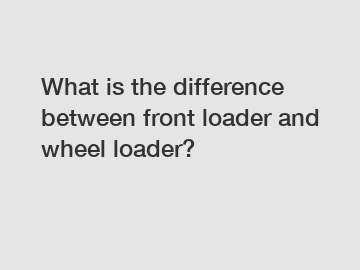What is the difference between front loader and wheel loader?
Front Loader vs. Wheel Loader: Understanding the Key Differences.
When it comes to heavy equipment used in construction, two common types of loaders are front loaders and wheel loaders. While they may seem similar at first glance, there are key differences between these two machines that make them suitable for different tasks. Understanding the unique characteristics of each loader can help contractors and project managers choose the right equipment for their specific needs.
Purpose and Design.

Front loaders, also known as front-end loaders or bucket loaders, are characterized by their lift arms located at the front of the machine. These loaders are designed to scoop and lift materials using a large bucket attached to the front of the arms. Front loaders are commonly used for tasks such as loading and unloading materials, digging, and transporting loose materials such as dirt, gravel, and sand.
On the other hand, wheel loaders are equipped with a front-mounted bucket as well, but they also feature four large wheels that provide mobility and maneuverability. Wheel loaders are designed for handling heavy loads efficiently in various terrains. They are commonly used in construction, mining, agriculture, and other industries that require moving large amounts of materials quickly and effectively.
Power and Performance.
Front loaders typically have less power and lifting capacity compared to wheel loaders. While front loaders are versatile and can handle a wide range of materials, they are better suited for lighter loads and tasks that do not require high lifting capabilities. In contrast, wheel loaders are known for their powerful engines, large bucket capacities, and high lifting capacities, making them ideal for heavy-duty applications that involve moving large volumes of materials over long distances.
Maneuverability.
One of the key differences between front loaders and wheel loaders is their maneuverability. Front loaders are more compact and agile, making them suitable for operating in tight spaces and confined work areas. Their narrow design allows them to navigate through narrow pathways and access hard-to-reach areas easily. In contrast, wheel loaders are larger and require more space to maneuver, but their four-wheel drive system enables them to operate efficiently on rough terrain, making them ideal for outdoor projects and uneven surfaces.
Versatility.
Front loaders are versatile machines that can be equipped with various attachments such as forks, grapples, and buckets to perform different tasks. They can be used for clearing debris, leveling ground, lifting pallets, and more. Wheel loaders, on the other hand, are known for their versatility in handling different types of materials, from rocks and soil to snow and logs. With quick coupler systems, wheel loaders can switch between different attachments easily, making them highly versatile machines for different applications.
Choosing the Right Loader for Your Project.
When deciding between a front loader and a wheel loader, it is essential to consider the specific requirements of your project. If you need a compact and agile machine for light to medium-duty tasks, a front loader may be the right choice. However, if you require a powerful and versatile machine for heavy-duty applications in challenging terrains, a wheel loader would be the best option. By understanding the key differences between front loaders and wheel loaders, you can make an informed decision and select the right equipment for your project.
Contact Us.
If you have any questions about choosing the right loader for your construction project or need expert advice on heavy equipment rentals, do not hesitate to contact us. Our team of professionals is here to help you find the perfect solution for your specific needs.
For more information, please visit tri axle trucks, 90 ton dump truck, electric dump truck in stock.

Comments
0